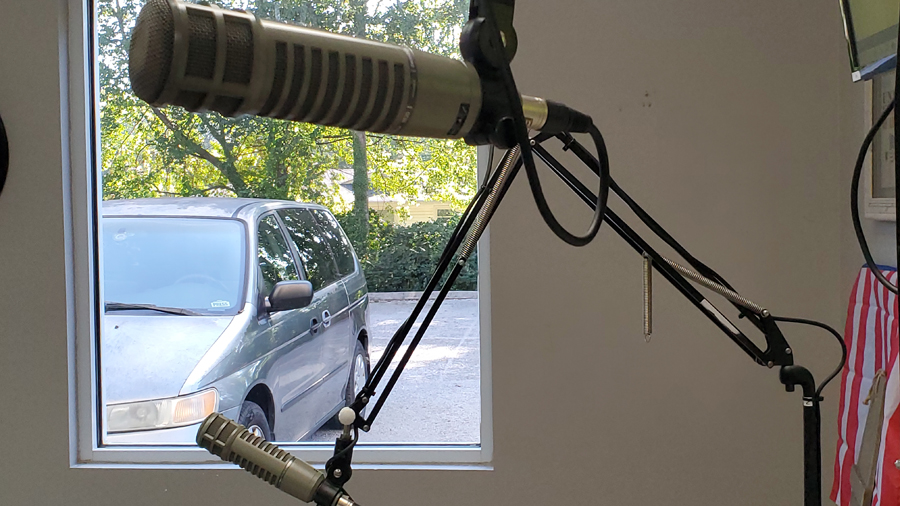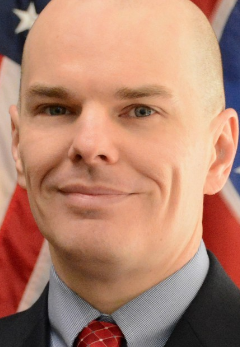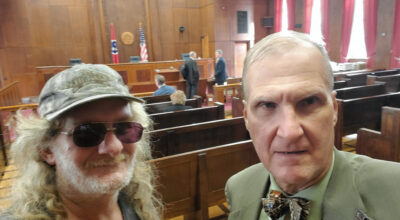
This minivan is at the center of my fight to overturn criminal activity by the state commissioner of revenue, David Gerregano, and his gaggle of lawyers and staff. (Photo David Tulis)
CHATTANOOGA, Tenn., Sunday, Dec. 3, 2023 — My fight in the labyrinth of administrative law to block a state-based fraud has in view thousands of working-class people and minorities abused by police statewide for at least the past six years.
By David Tulis / NoogaRadio Network
That is because state of Tennessee and its combination of police and deputies “administer” the TFRL — the Tennessee financial responsibility law of 1977 — as if the law makes Tennessee a “mandatory insurance” state requiring insurance as a condition of getting a driver license or registration tag (two of the three legs of having a state privilege).
Prosecution of people over the last five years has created hundreds of thousands of criminal charges statewide, mostly of blacks and the poor. The conviction rate over the past five years is 408,821 convictions between 2018 and 2022. There are 6.3 million registered “standard passenger vehicle plats” in the state, and 5.117 million insurance policies under TRL. Premiums flowing to insurance companies in 2022 are F$2.677 billion, according to department of revenue.
My case to stop illegal enforcement of this law is premised on the actual reading of the law in Title 55, chapter 12, of Tennessee code annotated, and all relevant court cases. We are not a mandatory insurance state. Period. We are an “after crash” voluntary insurance financial responsibility state.
Enforcement of the law otherwise is official misconduct and official oppression, pursuant to the state criminal code in T.C.A. § Title 39.

Brad Buchanan has been working for the Tennessee revenue department for nearly a year, having 18 years behind him as an attorney in state government. (Photo Brad Buchanan)
I face continuing irreparable harm by false imprisonment and false arrest if I cannot get the ship set aright with the help of administrative judge Brad Buchanan.
Irreparable harm to innocent journalist
The following analysis is one of four key parts in a motion for temporary injunction in the case Tulis v. DOR. To win temporary reprieve of a tag pending outcome of the case, I argue irreparable harm.
Tulis motion temporary injunction Tulis v. DOR
Petitioner uses his car for private purposes, for protectable 1st amendment personal liberty and Tenn. const. art. 1, sect. 19, press rights, among other rights. Secondarily, he uses his car under Gibbons v. Ogden, 22 U.S. 1, 6 L. Ed. 23 (1824), and under Booher to exercise the right of commerce at liberty under the federal congress and the regulatory apparatus of state of Tennessee.
Concerned for his personal safety from police violence ultra vires while using the people’s right of way, he asks the commissioner in a July 26, 2023, certified-mail inquiry if DOR will protect his person from abuse pending outcome of the contested case.
I am a radio journalist, with my occupation, calling, trade, vocation and living entirely in a studio and at city locations where news occurs. I use the automobile purely for private necessities, private business (not transportation) and do not carry goods or people for hire, private profit or gain in a way that affects the public interest and would require me to obtain permission from the departments of revenue and safety to participate in taxable activities under privilege, and am thus a nontaxpayer insofar as the driving privilege goes in Tennessee law pertaining to taxable activities, occupations, callings, vocations or trades.
Kindly tell me if the department will by document recognize my status as a private party on the road apart from the taxable, regulable activities otherwise under your purview.
DOR does not respond to this request.
Because police authorities statewide disregard the distinction between the personal liberty of travel on one hand and commercial use of the roads under state privilege on the other, petitioner avers continuing irreparable harm and threat of irreparable harm directed at him from police officers, deputies, troopers and others. Enforcement policies of long custom and usage in Hamilton County and Chattanooga reject this distinction, and so are bound to injure petitioner in the private use of the car, still bearing as it does the metal tax plate on the back, revoked by the commissioner and now expired, a motor vehicle without portfolio, as it were, without protections the privilege gives in face of local police custom. EXHIBIT No. 1, letter Chattanooga police department on prosecutions under TFRL pursuant to policy. EXHIBIT No. 2, letter Vince Dean, clerk of criminal court, Hamilton County, prosecutions under TFRL pursuant to policy. EXHIBIT No. 3 Revenue department letter citing 408,821 criminal convictions under TFRL in the past five years
His van is personal family chattel and property, and as an object typical of those of the day, as an automobile, is best suited for the exercise of rights to maintain life, limb, obligations and property.
Most obviously, being unable to drive in Tennessee limits the jobs available to a person and makes holding a job difficult once the person has it. “Automobile travel … is a basic, pervasive, and often necessary mode of transportation to and from one’s home [and] workplace.” Delaware v. Prouse, 440 U.S. 648, 662, 99 S.Ct. 1391, 59 L.Ed.2d 660 (1979). Some jobs require a person to drive as part of his duties, and even those jobs that do not themselves involve driving generally require the employee to be somewhere, reliably, on time. *** Based on its judicial notice of these aforementioned facts, the court concludes that it is beyond dispute that, at least as a general proposition, the cities, towns, and communities of Tennessee are pervasively *527 structured around the use of motor vehicles. Anyone who doubts that premise is welcome to attempt to run a day’s worth of errands in a rural Tennessee county with no car and very little money. The centrality of motor vehicle travel is, moreover, not solely a rural problem. Even the relatively dense city of Nashville, where the court sits, is deeply reliant on motor vehicle transport. If any city in this jurisdiction could be expected to be reasonably navigable without driving, it would be Nashville—and the court takes judicial notice that, to the contrary, Nashville is a city where motor vehicle travel is an essential part of ordinary life, particularly for anyone seeking to maintain or build economic self-sufficiency.
Thomas v. Haslam, 329 F. Supp. 3d 475, 520, 526–27 (M.D. Tenn. 2018), vacated and remanded sub nom on other grounds. Thomas v. Lee, 776 F. App’x 910 (6th Cir. 2019)
Ban on use of the motor vehicle constitutes a ban on the minivan’s use as a car.
Denial of the use of petitioner’s car infringes on his property rights in his occupation as press member because all law enforcement officers statewide believe that no one may use the public roads apart from proofs of commerce – starting with a “valid” tag. The harm threatened by these actors such as Hamilton County sheriff Austin Garrett and deputy Brandon Bennett serving respondent policy, and other policies operating in Tennessee, is of false imprisonment and false arrest. They operate against people such as petitioner as if there had been passed by the general assembly a bill of pains and penalties. However, no such bill of attainder, as they are called at law, has been passed. These parties operate as if one such bill had been passed, which would be facially unconstitutional as petitioner has right of protection at Tenn. const. Art. 1, sect. 7, on warrantless arrest, and equivalent protections in the federal constitution. Local law enforcement agencies (LEAs) prosecute private use of cars upon the entire class of people, again apart from warrant or indictment, as if bills of attainder, or bills of pains and punishments, had indeed been passed by the general assembly. But such bills are prohibited under the U.S. const. Art. 1, sect. 9 and art. 1 sect. 10.
Press member petitioner has devoted much of his career to reporting how police, deputies and others arrest people for the exercise of their rights apart from commerce privilege. Meaning, the arrest of people whose motor vehicle status is flagged with expired, suspended or revoked plates, or their persons flagged for expired, suspended or revoked driver licenses – all criminally prosecuted. Many of these people are in fact and as a matter of law not involved in the state privilege grant because they carry on no business under the authority of privilege. This authority is described in the key 1877 case, Phillips v. Lewis, 3 Shannon’s cases 230. EXHIBIT No. 4 (1)
Phillips v. Lewis, 3 Shannon’s Cases 230
Petitioner puts his finger on this problem in an initial filing in this case. That is his affidavit of mistake in which he says he is a victim of deceit and fraud that is attributable not to any one person or department of state, but one enculturated across society, its claims pressed by schooling, media, social relations and public expectation and belief about what is required of a citizen or inhabitant in the use of an automobile, and how its use is entirely tied up in state commercial privilege. (2)
Taxpayers v. nontaxpayers
In the affidavit the petitioner states that if it is true that private travel and communication is entirely banned in Tennessee if not under privilege administered by DOSHS, the department of revenue and all law enforcement agencies in all cities and counties, that he rescinds his signature on any and all state forms connected with the privilege — renounces said privileges — in preference of the exercise of his rights private. He is, thusly, if he cannot exercise both rights, willing to sacrifice commerce under privilege and retain enjoyment of his travel, communication, self-propulsion rights under the constitution. SEE APPENDIX No. 1.
The matter of privilege enforcement cannot be failed to be addressed in this contested case. If the hearing officer takes administrative, or judicial, notice of this important fact of law enforcement’s oppressing a right, it requires him to accept there is such a thing as private travel, dividing out by a solid white line the distinction between privileged use (transportation, traffic, taxpayers on the go) and private or free use (nontaxpayers pressing the gas pedal). If he denies that such a thing as private travel exists, then there must be a finding of fact and law that no distinction exists between taxpayer and nontaxpayer in the use of the roads. (Petitioner’s Affidavit of mistake indicates he will not yield the right of communication under the constitution to be able to exercise the privilege of driving and operating a motor vehicle.)
If he has a right of travel, unaffected by the state’s regulatory structure (see State v. Booher, 978 S.W.2d 953, 955–56 (Tenn. Crim. App. 1997)), there is no need for a temporary injunction, for petitioner can simply remove the plate from the back of the car and use the minivan as a car without a plate. But that guarantees his arrest for exercising his rights of ingress and egress, based on the land itself on which petitioner has abode.
Petitioner has indicated he does not use the disputed car as a carrier. But he has a right to do so, and is suing for the reinstatement of this right – this privilege to which he has a right. He is suing to have the tag restored (1) to avoid police activity that implicates ingress and egress rights to abuse them under presumption he is in commerce, and, (2) to be free to pursue the occupation, trade or calling as driver or operator of a motor vehicle.
Without a temporary reinstatement, he is subject to criminal charge that would be an irreparable injury to him and a knowing and intentional tort.
Footnotes
(1) Police power and regulatory authority under the UAPA are exercisable upon those “on the privilege” of driving or operating a motor vehicle. Phillips describes a privilege as an occupation, trade or calling such as the raising of bitches or jackasses for private profit and gain.
This pursuit or occupation is taxed, not as property, but as an occupation. Another element in this occupation is, that its object and pursuit is directed to a profit to be made off the general public, the merchant having a relation, by reason of his occupation, to the whole community in which he may do business, by reason of which he reaps, or is assumed to reap, the larger profit by drawing upon or getting the benefit of the resources of those surrounding him. The same idea is involved in the case of the peddler, who may range over a whole county by virtue of his license. His is an occupation of like character, a peculiar use of his capital varied only in some of its incidents.
Phillips at 240
(2) Affiant insists he will not waive one right to exercise another, but as belligerent claimant in person asserts firstly the fundamental right of communication and personal liberty of movement. His statement of rescission of authority of signature is conditional:
- If these employees succeed with colorable claims that affiant’s right to drive and operate a registered motor vehicle is simultaneously an admission that he yields, waives and surrenders enjoyment of the underlying federal right to communicate and travel freely, then affiant declares this affidavit operative, and all signatures of application void and null, as they are obtained under mistake and fraud.
(3) Booher quote giving with one hand (we recognize liberty of travel) and pretending to take it away with another (only “migration with the intent to settle” constitutes travel in our legal fiction):
We agree with the appellant that he enjoys a fundamental right to freedom of travel. *** Travel, in the constitutional sense, however, means more than locomotion; it means migration with the intent to settle and abide. Id. Thus, any American is free to travel from state to state, and to change his state of residence or employment whenever he desires, unrestricted by unreasonable government interference or regulation. See 16A C.J.S. Constitutional Law § 478 (1969). Whether a specific type of travel is protected by one’s constitutional right to travel depends upon the intent which motivates the movement. Id.
2 In the present case, the appellant asserts that the State of Tennessee has unduly infringed upon his “right to travel” by requiring licensing and registration of his motor vehicles prior to operation on the public roadways of this state. However, contrary to his assertions, at no time did the State of Tennessee place constraints upon the appellant’s exercise of this right. His right to travel within this state or to points beyond its boundaries remains unimpeded. Thus, not only has the appellant’s right to freedom of travel not been infringed, but also, we cannot conclude that this right is even implicated in this case. Rather, based upon the context of his argument, the appellant asserts an infringement upon his right to operate a motor vehicle on the public highways of this state. This notion is wholly separate from the right to travel. *956 3 The ability to drive a motor vehicle on a public highway is not a fundamental “right.” *** (citations omitted). Instead, it is a revocable “privilege” that is granted upon compliance with statutory licensing procedures.
State v. Booher, 978 S.W.2d 953, 955–56 (Tenn. Crim. App. 1997) (emphasis added)

